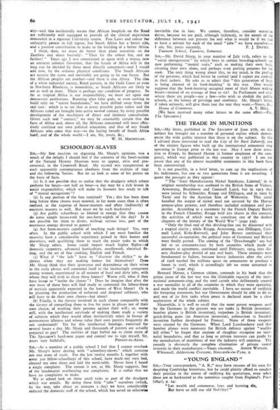THE TRADE IN MUNITIONS
SIR, My letter, published in The Spectator of June 27th, on this subject has brought me a number of personal replies which demon- strate the wide public interest that there is on the subject. In this I advised those interested to read the Life of Sir Basil Zaharof I, one of the sinister figures who built up the international armament ring operating in Europe prior to the last war. May I now draw atten- tion to Krupp, by Bernard Menne (a former employee of the com- pany), which was published in this country in 1937? I am not aware that any of his almost incredible statements in this book have been controverted.
It is not possible, in a brief letter, to sum up the implications of his indictment, but one or two quotations from it are revealing. I quote the passages as they appear: " The ' Steel Manufacturers Nickel Syndicate, Limited,' in its original membership was confined to the British firms of Vickers, Armstrong, Beardmore and Canunell Laird, but in 1903 they were joined by Schneider, Krupp and Dillingen, and in 1905 by Terri and by the Austrian firm of Witkowitz. This cartel handled the output of nickel steel not covered by the Harvey armour-plate process, and therefore included ordnance and pro- jectiles. According to a statement by the French Deputy Barthe in the French Chamber, Krupp held 2 io shares in this concern, the activities of which were - to constitute one of the darkest chapters of the history of the World War " (page 259).
" Only the final end of this dividing-line can be discerned with a tragical clarity ; while Krupp, Armstrong, ana Dillingen, Cam- mell Laird, Koln-Rottweil, and John Brown continued their successful co-operation, the political ways of Germany and Britain were finally parted. The coming of the ' Dreadnought ' era had led to an armament-race by both countries which made all attempts at agreement, continued until February, 1914, into illu- sory shadow-play devoid of any real basis. These attempts were foredoomed to failure, because heavy industries after the crisis of 1908 needed the millions spent on armaments to produce a boom in steel, which it accordingly left no stone unturned to ensure " (page 264).
Bernard Menne, a German citizen, contends in his book that the prime cause of the last war was the illimitable rapacity of the inter- national armament-ring, and the steel cartels who deliberately created a war mentality in all of the countries in which they were operating, and made the world conflict inevitable. I have no means of verifying the foregoing statement, but our Government should be able to do so, and one of its first tasks when peace is declared must be a close exploration of the whole subject.
Meanwhile, it is well to recall that the most potent weapons used by the Germans in the present war are tanks (a British invention), bomber planes (a British invention), torpedoes (a British invention), quick-firing guns (an American invention), submarines (a Swedish invention further developed by France). None of these weapons were created by the Germans. When Lord Londonderry said that bomber planes were necessary for British defence against "warlike hill tribes " he forgot that engines of slaughter recognise no terri- torial boundaries, and that as long as private interests can profit by the manufacture of munitions of war the industry will continue. The remedy is obviously the complete elimination of private vested

























 Previous page
Previous page